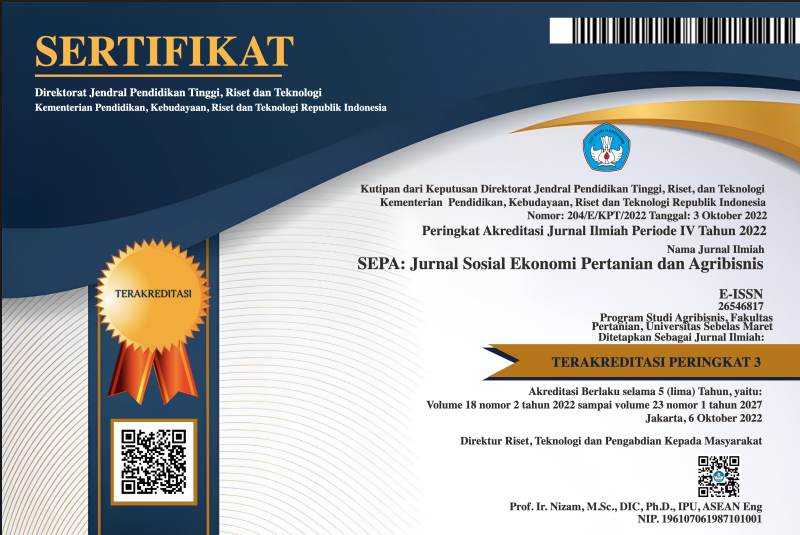FACTORS AFFECTING THE SUCCESS OF INCLUSIVE BUSINESSES OF CASSAVA FARMER IN SUPPORTING FOOD SECURITY AND FARMER WELFARE
Abstract
The inclusive business model places farmers involved in the cassava value chain thereby providing market opportunities for farmers. The success of inclusive business is expected to increase food security and balance village development, which will have a major impact on efforts to improve the welfare of cassava farmers. The objectives of this research are analyzing the factors that influence the success of cassava farmers' inclusive businesses. The research method used is a quantitative method, the data used is primary data obtained through structured interviews using questionnaires given to 120 respondents, while secondary data comes from literature studies that are relevant to the research. The data obtained will be analyzed based on its objectives, SEM analysis. The Result is factor that most indirectly influences inclusive business is farmers' motivation towards adopting innovation and technology. Meanwhile, the variables that have a direct influence are the adoption of technological innovation, partnerships, financial access and the role of government.
Keywords
Full Text:
PDFReferences
AE, O., Ajayi, O. D., Oluwalana, E. O. A., & Ogunmola, O. O. (2017). What does literature say about the determinants of adoption of agricultural technologies by smallholders farmers. Agri Res Tech: Open Access J, 6(555676), 10–19080.
Apryani,AY.(2024).Analisis Model Bisnis Inklusif pada RantaiNilai Kopi Arabika diJava Frinsa Estate Pangalengan.IPB University.
Bijman, J., & Wijers, G. (2019). Exploring the inclusiveness of producer cooperatives. Current Opinion in Environmental Sustainability, 41, 74–79.
Badan Pusat Statistik. (2020). Perkembangan Harga Singkong. https://www.bps.go.id/id.
Chamberlain, W., & Anseeuw, W. (2019). Inclusive businesses in agriculture: Defining the concept and its complex and evolving partnership structures in the field. Land Use Policy, 83, 308–322.
Chin, W. W., & others. (1998). The partial least squares approach to structural equation modeling. Modern Methods for Business Research, 295(2), 295–336.
de Boer, D., Limpens, G., Rifin, A., & Kusnadi, N. (2019). Inclusive productive value chains, an overview of Indonesia’s cocoa industry. Journal of Agribusiness in Developing and Emerging Economies, 9(5), 439–456.
FAO. (2022). Food Outlook Biannual Report n Global Food Markets. https://openknowledge.fao.org/handle/20.500.14283/cc2864en
Faqih, T. H., Putri, R. F., Dewi, R. S., Septiana, A., & Wijaya, A. (2023). Technological Innovation For Sustainability: Encouraging Economic Growth In The Digital Era. International Conference on Health Science, Green Economics, Educational Review and Technology, 5(1), 688–692.
Ghozali, I., & Latan, H. (2015). Partial least squares konsep, teknik dan aplikasi menggunakan program smartpls 3.0 untuk penelitian empiris. Badan Penerbit UNDIP, 4(1), 35–4.
Hair, J. F., Risher, J. J., Sarstedt, M., & Ringle, C. M. (2019). When to use and how to report the results of PLS-SEM. European Business Review, 31(1), 2–24. https://doi.org/10.1108/EBR-11-2018-0203
Hair, J. F., & Sarstedt, M. (2021). Explanation Plus Prediction—The Logical Focus of Project Management Research. Project Management Journal, 52(4), 319–322. https://doi.org/10.1177/8756972821999945
Horton, D., Donovan, J., Devaux, A., & Torero, M. (2016). Innovation for inclusive value-chain development: Highlights.
Hilmanugraha, I. (2017). Faktor-Faktor Keberhasilan Model Bisnis Inklusif Pada Rantai Nilai Susu Sapi Segar (Studi Kasus KUD Giri Tani Kabupaten Bogor).
Jezeer, R., Slingerland, M. A., van der Laan, C., & Pasiecznik, N. (2019). Improving smallholder inclusiveness in palm oil production—a global review. Tropenbos International.
Kusnandar, K., Rahayu, W., Setyowati, N., & Sutrisno, J. (2016). Strategy Planning Formulation For Agroindustry Based On Cassava To Anticipate Climate Change (SWOT Analysis And Balance Scorecard Approach) (Doctoral dissertation, Sebelas Maret University).
Kelly, S., Vergara, N., & Bammann, H. (2015). Inclusive business models. Rome: Food and Agriculture Organization of the United Nations.
Ningsih, S. R. (2024). Pengaruh Teknologi Terhadap Produktivitas Tenaga Kerja di Indonesia. Benefit: Journal of Bussiness, Economics, and Finance, 2(1), 1–9. https://doi.org/10.37985/benefit.v2i1.341
Permatasari, P. C. (2018). Model Bisnis Inklusif untuk Mendukung Kelangsungan Usaha Petani: Studi Kasus Rantai Nilai Kopi Arabika Jawa Timur, Indonesia. IPB University.
Putri, R. E., & others. (2017). Analisis Perbedaan Kinerja Petani Kakao Mitra dan Non Mitra dengan PT Olam Indonesia di Kabupaten Pesawaran.
Riawati, N. (2017).Strategi Pemberdayaan Petani Singkong Dan Pengusaha Tape Melalui Kebijakan Regulasi Pemerintah Daerah Kabupaten Bondowoso.
Richard, Y. F., Longgy, D. H. A., & Epin, M. N. W. (2024). Peran literasi keuangan dan teknologi keuangan melalui inklusi keuangan untuk keberlanjutan umkm. Jurnal Ilmu Ekonomi & Sosial, 15(1), 1-20.
Ronaghi, M. H., & Forouharfar, A. (2020). A contextualized study of the usage of the Internet of things (IoTs) in smart farming in a typical Middle Eastern country within the context of Unified Theory of Acceptance and Use of Technology model (UTAUT). Technology in Society, 63, 101415.
Ros-Tonen, M. A. F., Bitzer, V., Laven, A., de Leth, D. O., Van Leynseele, Y., & Vos, A. (2019). Conceptualizing inclusiveness of smallholder value chain integration. Current Opinion in Environmental Sustainability, 41, 10–17.
Saptana, Ar-Rozi, A. M., Perwita, A. D., & Raharjo, A. S. S. (2024). Rice supply-chain management performance and business ecosystem support in Klaten District. BIO Web of Conferences, 119. https://doi.org/10.1051/bioconf/202411902002
Suryani, R. (2020). Outlook Ubi Kayu: Komoditas Pertanian Subsektor Tanaman Pangan. Pusat Data Dan Sistem Informasi Pertanian Sekretariat Jenderal Kementerian Pertanian ISSN: 1907-1507, 72. https://satudata.pertanian.go.id/assets/docs/publikasi/OUTLOOK_UBI_KAYU_2020.pdf
Triandini, E., Wijaya, I. G. N. S., Suniantara, I. K. P., Wulandari, R., Pratami, W. C. A., Djarkasih, A. R., ... & Larasati, N. (2023, March). Analysis Adoption of Information Technology Using the UTAUT Method on Off-taker Poultry Farmers in Indonesia. In Proceedings of the 13th Annual International International Conference on Industrial Engineering and Operations Management, Manila, Philippines (pp. 6-9).
Virianita, R., Soedewo, T., Amanah, S., & Fatchiya, A. (2019). Persepsi petani terhadap dukungan pemerintah dalam penerapan sistem pertanian berkelanjutan. Jurnal Ilmu Pertanian Indonesia, 24(2), 168-177.
Yamin, S. (2022). Olah Data Statistik SmartPLS 3 SmartPLS4 AMOS STATA, Cetakan Kedua. Depok: Dewangga Energi Internasional.
Zulfiqar, K., Aslam, M., & Aslam, A. (2016). Financial Inclusion and Its Implications for Inclusive Growth in Pakistan. Pakistan Economic and Social Review, 54(2), 297–325.
DOI: https://doi.org/10.20961/sepa.v22i2.95723
Refbacks
- There are currently no refbacks.
Jurnal SEPA indexed by:




.png)
3.png)





.png)






